House flies and fruit flies are the two common species of flies that you may see in your house or backyard. But regardless of the difference in their sizes, you would always want to get rid of them. Some insecticides work effectively, but they contain harmful chemicals. Therefore, you might want to use different scents.
But, what are the scents that will keep flies away? Flies hate the smell of certain plants, herbs, and essential oils. Among them are basil, citronella, cinnamon, cloves, eucalyptus, lavender, lemongrass, marigold, peppermint, rosemary, sweet woodruff, tansy, and Venus flytrap. All of them have been proven effective.
Generally speaking, flies are most active during the day and take a rest when the sun goes down. These globally invasive pests prefer warm weather and will die in the winter. Amazingly, common house flies have a very strong sense of smell. Therefore, you should take advantage of the natural ways to scare them away.
What Scents Attract Flies?
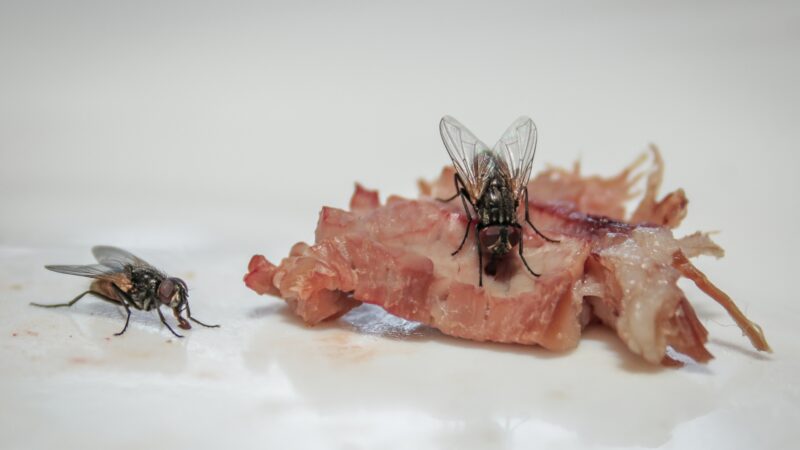
Knowing what scents entice flies is essential for preventing them from being attracted to your home and reducing their presence.
The following list of popular scents that can entice flies includes:
- Rotting, stinking odors
- Syrupy, sweet aromas
- Damp, moldy odors
If there is a stench of dung or animal waste, house flies could also enter the yard. If you keep the doors or windows open, they may enter your home.
Fruit that is overripe or rotting that is left out might attract fruit flies, as can spilled liquids or open containers that are left unchecked.
Why You Should Repel Flies?
Flies come in a wide number of varieties, and the majority of them harm a wide range of plants. The Whitefly is arguably the most renowned species of fly that is recognized for directly harming plants.
Whiteflies consume plant juices, turning the leaves and fruit of the plant yellow and shriveling up. Whiteflies can swiftly drain plants to the point where they die if there is a significant infestation in your garden.
Fly swarms can quickly become an annoyance in addition to harming numerous plant life forms. This is especially true if a lot of flies get inside your house or popular outdoor places.
If you are not vigilant and take the necessary precautions to repel them, kitchens, spaces with plants, and untreated standing water might result in swarms of flies. When humans eat foods that are fly-infested, a disease may develop.
What Diseases Can You Get From a Fly?
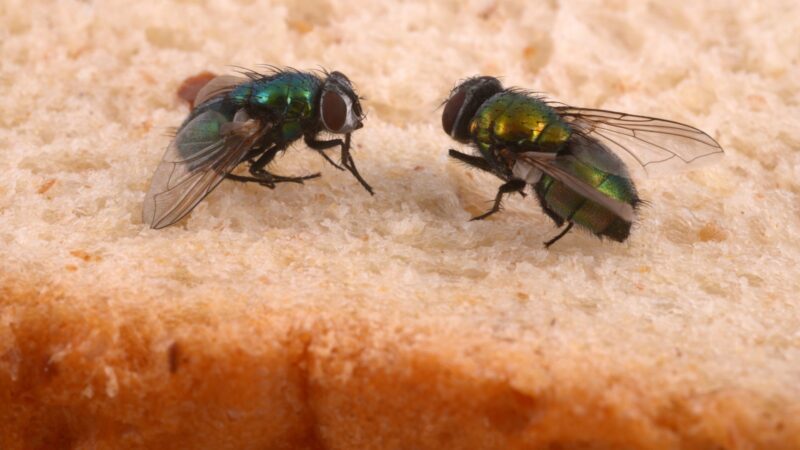
Also known as Musca domestica, house flies have been suspected to be loaded with about 351 different types of bacteria and transmit at least 65 infectious diseases to humans. This includes anthrax, cholera, conjunctivitis, dysentery, leprosy, poliomyelitis, salmonella, tuberculosis, tularemia, and typhoid fever.
House flies are known for feasting on garbage, carcasses, feces, and other decaying organic matter. They also breed and lay eggs on them. From there, the flies will pick up pathogens and drop them on human foods. Flies may not eat your food, but they can still transmit diseases through their droppings.
Related: What Is the Purpose of Flies? | Information and Facts
What Are the Scented Plants That Repel Flies?
As mentioned above, certain scented plants repel flies, regardless of their species. Most of these aromatic plants do well outdoors, especially in your garden. These natural fly repellents also easily grow indoors and require less maintenance. So without further ado, let’s discuss some of them.
1. Basil
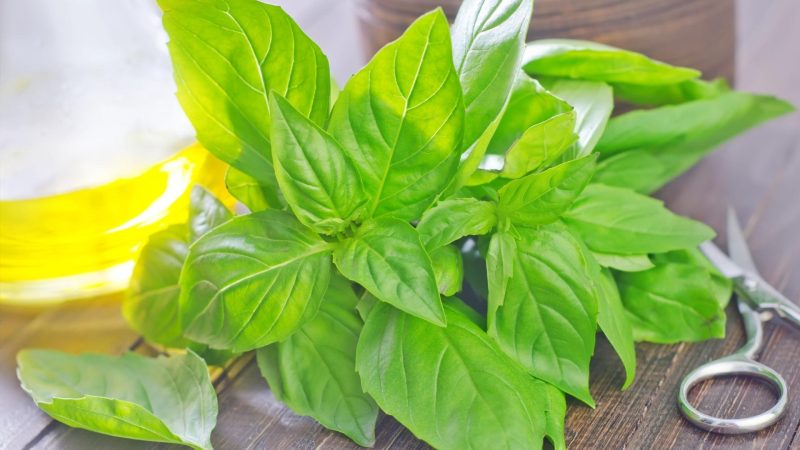
Scientifically known as Ocimum basilicum, basil is more than just a culinary herb for your herbaceous salads and other delicious recipes. The basil plant is also a great addition to your garden. It produces a heavenly aroma and an intense scent that flies hate so much. The best time to plant basil is in the late spring.
2. Bay Leaves
Also called laurel leaves, bay leaves are fragrant leaves from the laurel tree. They are known as a standard seasoning in lots of savory dishes. Dried bay leaves have an aromatic scent similar to eucalyptus. This is why they are also famous for repelling pest insects such as flies, fleas, cockroaches, and wasps.
3. Citronella
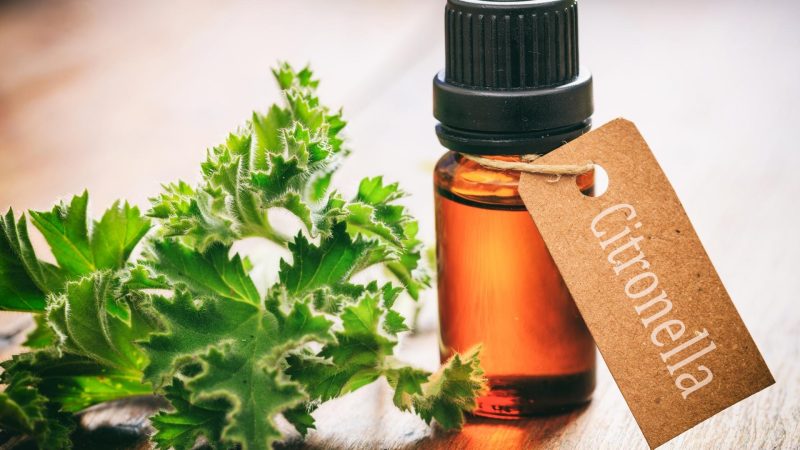
Scientifically known as Cymbopogon nardus, citronella is a tropical ornamental grass that is best known as a mosquito repellent. This fragrant plant cannot kill flies but can surely keep them away from your garden. However, citronella oil and citronella candles are not as effective as insect repellents that contain DEET.
4. Cinnamon
Cinnamon is a very delicious spice taken from the inner bark of cinnamon trees. The cinnamon sticks are made into powder, which has lots of health benefits. Meanwhile, the scent of cinnamon essential oil deters both house flies and fruit flies. You can also add water to cinnamon essential oil and use it as an insect spray.
5. Cloves
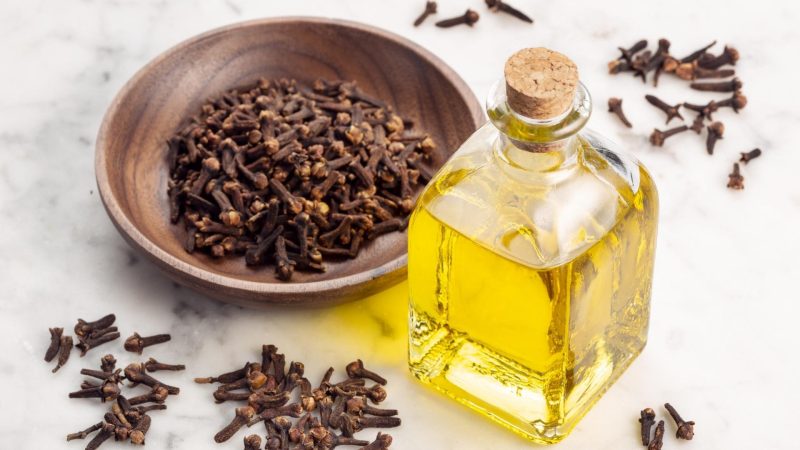
Scientifically known as Syzygium aromaticum, cloves are aromatic flower buds of a clove tree. Clove essential oil is extracted from these buds and is mainly used as a natural insecticide. Its major component, eugenol, is effective on a wide variety of household pests such as flies, cockroaches, fleas, wasps, and spiders.
6. Eucalyptus
Eucalyptus trees are known for having medicinal properties. The eucalyptus oil, which is extracted from their leaves, can help silence cough, disinfect wounds, ease joint pain, freshen breath, and many more. It also has a strong, sweet, woody scent, which can repel flies, mosquitoes, and other small pest insects.
7. Lavender
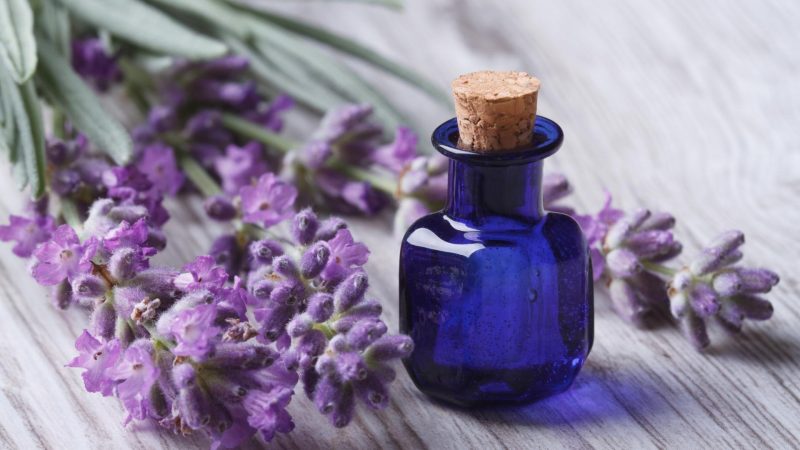
Lavender is not only a flowering plant and a therapeutic plant; it is also a fragrant plant. Its flowers have a strong floral, long-lasting scent that repels fleas, flies, moths, and mosquitoes. Therefore, you can hang them around your house. On the other hand, lavender oil is a great help for treating a variety of ailments.
8. Lemongrass
Lemongrass should not be confused with lemon fruit, and they come from two different plants. Although they have the same health benefits, the strong lemon scent in lemongrass has been tested and proven effective in repelling flies and mosquitoes. On the other hand, lemon oil works well only in treating bug bites.
9. Marigold
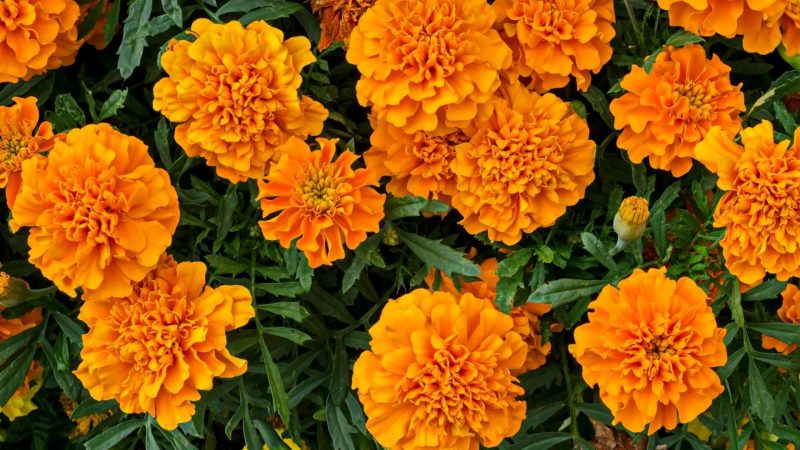
Marigold is an annual plant that produces yellow-orange flowers and has lots of benefits to your garden. Aside from attracting beneficial insects, marigold flowers also protect plants from parasitic wasps and flies because of their pungent smell. However, marigolds are mildly toxic to dogs when ingested and in direct contact.
10. Peppermint
Peppermint is a hybrid mint between spearmint and watermint. This flowering plant is best known for its active components, menthol, and menthone, and has lots of culinary and medicinal benefits. Peppermint essential oil is very effective in repelling insects such as ants, flies, fleas, ticks, spiders, and cockroaches.
11. Rosemary
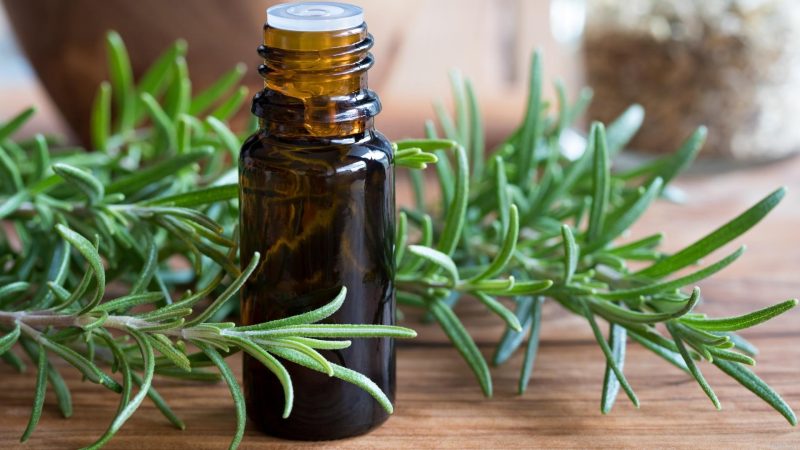
Rosemary is a perennial rounded evergreen shrub that has slender, gray-green leaves, which are widely used as a food flavoring. Its intense, aromatic fragrance is also great for annoying pesky insects such as flies, mosquitoes, bugs, and moths. Nevertheless, rosemary oil can be more effective when combined with clove oil.
12. Sweet Woodruff
Sweet woodruff is a flowering perennial plant that can spread very fast and will invade your garden. On the other hand, its white blossoms and dried leaves smell like combined cinnamon, honey, and vanilla. By crushing and sprinkling them at your home entrance and decks, it can effectively ward off flies and other insects.
13. Tansy
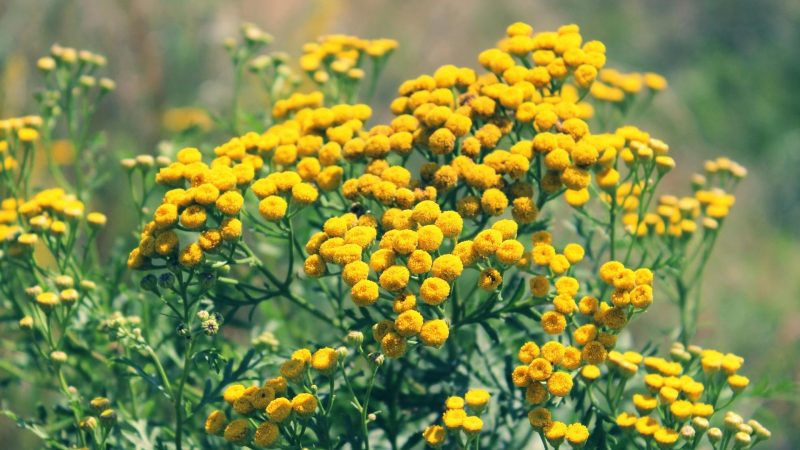
Scientifically known as Tanacetum vulgare, tansy should not be confused with tansy ragwort. But be careful; tansy contains a poisonous chemical called thujone, which can lead to death when ingested. On the other hand, this noxious weed is also known for repelling pests such as ants, flies, fleas, mosquitoes, and even mice.
14. Venus Flytrap
As the name suggests, the Venus flytrap is a carnivorous plant that traps and eats flies and other insects. This flowering plant has leaf blades with stiff hairs. Once an insect lands on it and touches the hairs, the leaf blades will immediately close tightly, and the insect will die inside. But don’t worry; it cannot trap humans.
Do Flies Hate the Smell of Apple Cider Vinegar?
Flies don’t hate the smell of apple cider vinegar. In fact, they are attracted to its aroma scent. To use it as a fly repellent, mix it with a few drops of dish soap and place it in a bowl or a tall glass. Shortly, the soap will break the surface tension of the vinegar. Once the flies land on the mixture, they will easily get drowned.
How Can I Use Cayenne Pepper to Get Rid of Flies?
Cayenne pepper is not just a spicy ingredient in foods and is a great provider of various health benefits. It is also very useful as a natural fly repellent. Simply mix one teaspoon of cayenne pepper with one cup of water. Mix it thoroughly and spray the mixture around your house. Just make sure it won’t get into your eyes.
Which Incense Scent Will Deter Flies?
The word “incense” came from the Latin word for “to burn.” Therefore, incense is a plant matter, that when burned, will emit a fragrant aromatic smoke. It comes in various forms, including sticks, candles, and coils, and is used widely in many religious practices and meditation. Incense is also used as an insect repellent.
Mosquito coils are an example of incense. However, they contain harmful chemicals. Therefore, it is not recommended as a fly repellent. So if you want to repel flies while enjoying the fresh air, try using incense. They don’t usually cause allergies and are not harmful to your pets.
Here are some of them:
- Citronella candles
- Cinnamon incense sticks
- Lavender incense sticks
- Lemongrass candles
- Rosemary incense sticks
What Is the Best Natural Fly Repellent?
All of the above scents can effectively keep flies away but may work differently. If your house is already infested with flies, you might want to use a combination of different natural fly repellents. Nevertheless, the best way to get rid of them is by thoroughly cleaning your surroundings and removing things that attract them.
Related: How to Get Rid of Fruit Flies Naturally? | The Effective Guide
List of Sources
Jacobs, S. (2017). House Flies. PennState Extension.
Renkema, J. M., Wright, D., Buitenhuis, R., Hallett, R. H. (2016). Plant essential oils and potassium metabisulfite as repellents for Drosophila suzukii (Diptera: Drosophilidae). Scientific Reports.
Crew, B. (2017). How does the Venus flytrap work? University of Tasmania.
Baker, B. P., Grant, J. A. Rosemary & Rosemary Oil Profile. Cornell University.
- How to Get Rid of Copperheads | Practical Guide - August 27, 2023
- How to Get Rid of Corn Snakes | What Makes Them Aggressive? - August 27, 2023
- How to Get Rid of Alligators | Safety Measures and Removal Methods - July 16, 2023

